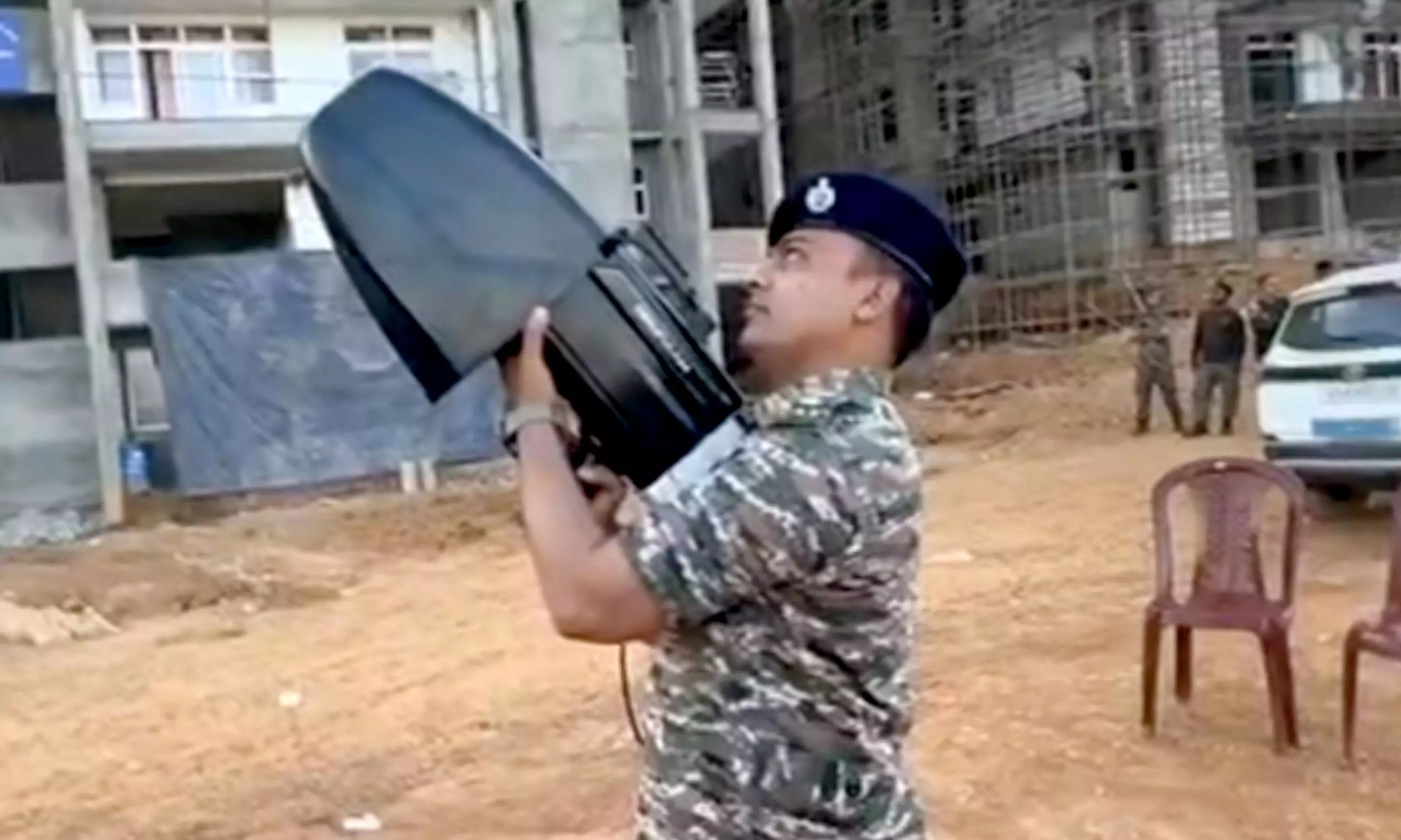
- Home
- India
- World
- Premium
- THE FEDERAL SPECIAL
- Analysis
- States
- Perspective
- Videos
- Sports
- Education
- Entertainment
- Elections
- Features
- Health
- Business
- Series
- In memoriam: Sheikh Mujibur Rahman
- Bishnoi's Men
- NEET TANGLE
- Economy Series
- Earth Day
- Kashmir’s Frozen Turbulence
- India@75
- The legend of Ramjanmabhoomi
- Liberalisation@30
- How to tame a dragon
- Celebrating biodiversity
- Farm Matters
- 50 days of solitude
- Bringing Migrants Home
- Budget 2020
- Jharkhand Votes
- The Federal Investigates
- The Federal Impact
- Vanishing Sand
- Gandhi @ 150
- Andhra Today
- Field report
- Operation Gulmarg
- Pandemic @1 Mn in India
- The Federal Year-End
- The Zero Year
- Science
- Brand studio
- Newsletter
- Elections 2024
- Events
- Home
- IndiaIndia
- World
- Analysis
- StatesStates
- PerspectivePerspective
- VideosVideos
- Sports
- Education
- Entertainment
- ElectionsElections
- Features
- Health
- BusinessBusiness
- Premium
- Loading...
Premium - Events

The Centre has assigned control of law and order in the hands of a retired DG (CRPF), sidelining the state's forces, but this has not only failed to bring peace but also exacerbated tensions
A large group of students, mostly in school or college uniforms, held a massive protest outside the Raj Bhavan in Imphal on Monday (September 9). They were ostensibly protesting the intermittent closure of educational institutions amid escalating violence for more than a year.
The state education department announced the closure of schools on September 9 and 10. Tensions remained high as the police used tear gas and batons to disperse the protesters.
Students' demand
The protest followed drone and missile attacks in the Imphal Valley that killed three people.
The students demanded a meeting with the Governor to voice their frustration, calling for the withdrawal of Central forces, whom they blame for failing to restore peace despite ongoing ethnic violence for over 16 months.
They also sought the removal of the state's security advisor appointed by the Centre and the transfer of the control of the Unified Command formed to oversee the violence in the state since May 2023.
Earlier, and even after the students’ protest, thousands of residents in five Imphal Valley districts formed a human chain to denounce the drone and missile attacks.
Inept handling of crisis
For the past 16 months, the Union Ministry of Home Affairs (MHA) has been the de-facto overseer of the law and order situation in Manipur. Its control, however, has been marked by significant mismanagement and inept handling, as evidenced by the recent resurgence of violence in the state, reflecting a failure of both strategy and execution.
As far back as the first few days after ethnic violence broke out last year, there were reports that Article 355 had been imposed on Manipur, but in a surreptitious manner.
Article 355 of the Constitution is part of the provisions related to the emergency powers of the Union government in dealing with states. It states: "It shall be the duty of the Union to protect every State against external aggression and internal disturbance and to ensure that the government of every state is carried on in accordance with the provisions of this Constitution."
No formal declaration
There was no such formal declaration by the Centre or the state government. And despite denials and counter-denials, there were reports that Chief Minister N Biren Singh himself has admitted to the de-facto imposition of Article 355.
Since May 2023, 60,000-70,000 Central Armed Police Forces (CAPF) have been stationed in Manipur to manage the ethnic violence that began between the Meitei and Kuki communities. These forces include the Indian Army, Assam Rifles and additional units from the Central Reserve Police Force (CRPF).
On February 28, 2024, then Governor Anusuiya Uikey revealed that 198 CAPF companies and 140 Army columns had been deployed, along with state police forces, to maintain law and order.
Federal structure overlooked
Despite the Union government’s intervention, which effectively sidelined the democratically-elected Chief Minister, the conflict continues to escalate.
The MHA’s decision to replace the local leadership in handling the state’s security has proved disastrous.
In particular, the appointment of Kuldiep Singh, a former Director General of the CRPF, as security advisor, and Rajiv Singh, an IPS officer from Tripura, as the state police chief, has drawn criticism due to their limited understanding of Manipur’s complex socio-political dynamics.
Outsiders don’t get it
The most common refrain of local experts is that Rajiv Singh's lack of experience in the state has hindered the effective management of security forces on the ground.
In short, it means that security in Manipur cannot be managed through top-down command without intimate knowledge of local communities, ethnic fault lines and, above all, ground realities.
The disconnect between the Centre’s directives and the unique ethnic composition of Manipur with differing political aspirations has only deepened the crisis. This is despite the fact that there were over 60,000-70,000 armed central forces.
Many voices are being raised as to why the Centre has not been able to bring a decisive end to the ethnic violence.
The ethnic divide
The core issues behind the ethnic violence in Manipur now lie in the palpably irreconcilable tensions between the Meitei and Kuki-Zo communities.
Historically, Manipur’s ethnic divide has been shaped by complex interactions involving land rights, illegal immigration, trans-border drugs/narcotics smuggling and ethnicised-exclusivist political aspirations.
The MHA, tasked with mitigating these tensions, has been unable to bring credible representatives from both sides to the negotiating table.
Interlocutors appointed by the MHA, including senior intelligence officials, have failed to establish any meaningful dialogue between the two warring groups. This has only intensified mistrust and deepened the ethnic divide.
Resurgence of violence
The failure of dialogue is evident in the recent resurgence of violence. Kuki-Zo insurgent groups, many of which have ties to ethnic armed organizations in Myanmar, particularly in Chin state, have utilised the temporary lull in violence to strengthen their ranks and gain access to sophisticated weaponry.
It is believed that Kuki militant outfits in Manipur have received substantial support from their counterparts across the Myanmar border, including training in drone operations and the use of advanced weaponry.
These groups have reportedly bolstered their ranks with illegal Kuki-Chin immigrants from Myanmar, further complicating the ethnic and security situation in Manipur.
Assam Rifles and faulty SoO
One of the key failures of the Union government has been its continued reliance on the controversial ‘Suspension of Operations’ (SoO) agreement with Kuki insurgent groups. The SoO, initially signed in 2008 during the Manmohan Singh government, was intended to prevent hostilities between Kuki militants and security forces.
It should also be remembered that the original SoO was not a tripartite agreement. It was signed between the Assam Rifles and some Kuki militant groups in 2005.
O Ibobi Singh, former Manipur Chief Minister and Congress leader, admitted in the state Assembly that it was done without the knowledge of the Manipur government and state forces continued to arrest the militants.
The Manipur government signed the pact only in 2008. Since then, critics argue that the agreement has provided Kuki militants with a degree of immunity and emboldened them to expand their influence, particularly in illegal activities like narcotics trafficking.
The Assam Rifles, a Central paramilitary force tasked with maintaining order along the India-Myanmar border, has come under heavy criticism for allegedly allowing illegal Kuki-Chin illegal immigrants to enter and settle in Manipur’s hill districts. Reports suggest that many of these immigrants have been involved in poppy cultivation and drug trafficking, further destabilising the region.
Failure to revoke SoO
In 2022, the Biren Singh government in Manipur attempted to revoke the SoO agreement unilaterally, citing the escalating threat posed by Kuki insurgent groups.
However, the Union government refused to follow suit, leaving the agreement in place. The refusal to revoke the SoO has led to widespread resentment among the Meitei community, who view the Kuki militants as operating with impunity under the protection of the Assam Rifles and other Central forces.
The recent escalation in violence, including brazen attacks by Kuki insurgents using drones and rockets, reflects the failure of the Union government’s policies in Manipur.
The Manipur Valley community has grown increasingly distrustful of the Central forces, who they accuse of allowing Kuki militants to gain strength.
Leave it to Manipuris
The MHA’s current approach in Manipur, which has centralised control of law and order in the hands of a retired DG (CRPF) officer and sidelined the Chief Minister, has not only failed to bring peace but also exacerbated tensions.
Local leaders, including Biren Singh, have called for the return of control over the state security forces to the elected government. The recent meetings between the Chief Minister and Governor Lakshman Acharya have brought this demand to the forefront. The students’ protest on Monday echoed the demand.
It is high time New Delhi recognised its top-down security approach in Manipur is unsustainable and has not been able to alter the dynamics of violence in more than a year and a half.
Restoring State control over the law and order machinery and empowering the state government to manage its security forces, as is the norm across the country, is essential for resolving the crisis.
Or, take the people of Manipur into confidence. The people of Manipur deserve a security apparatus accountable to them, not to distant bureaucrats in New Delhi.
(The Federal seeks to present views and opinions from all sides of the spectrum. The information, ideas or opinions in the articles are of the author and do not necessarily reflect the views of The Federal.)


